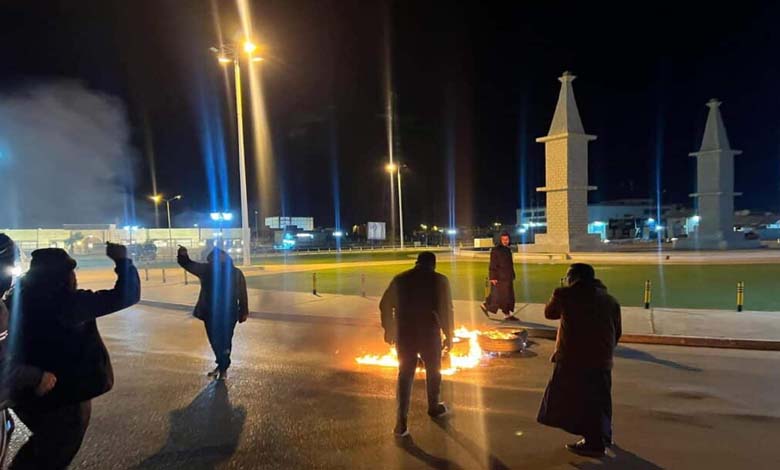Protests in Tripoli Call for Dbeibah and His Government to Step Down

Forces loyal to the Government of National Unity opened fire on demonstrators in various parts of the capital, while protesters set military vehicles belonging to Brigade 444 on fire.
On Wednesday evening, massive demonstrations erupted in Libya’s capital, Tripoli, as hundreds gathered in front of the Prime Minister’s Office demanding the dismissal of Prime Minister Abdulhamid Dbeibah, blaming him for the resurgence of violence in the city. The protests came in response to recent military escalation that ended a period of relative calm.
-
Financial Strangulation and Stalled Dialogue with Haftar Threaten Dbeibah’s Government Continuity
-
Mohammed el-Menfi intensifies pressure on Dbeibah by criticizing spending file
In past weeks, Tripoli had witnessed a fragile stability following local and international efforts to establish a ceasefire and ease tensions among rival factions. However, the renewed clashes between pro-Dbeibah forces, such as the “444th Combat Brigade” and the “Deterrence Apparatus”, have dealt a blow to hopes for peace. Protesters accused the Government of National Unity of sparking the violence, particularly through recent decisions to restructure security institutions.
Despite a heavy security presence, protesters reached the government headquarters perimeter, raising slogans calling for Dbeibah‘s resignation and blaming him for the return of warfare. Security forces responded by opening fire, which escalated the situation, with reports of injuries due to the use of live ammunition.
-
Failure of Inter-Libyan Dialog Meeting Sparks War of Words between Dbeibah and Bachaga
-
Dbeibah after the Blinken meeting : Libya mercenaries must leave
The protests spread across Tripoli municipalities, including Abu Salim, Souq Al-Jumaa, and Ain Zara, reflecting growing public outrage. Protesters carried banners condemning what they called “unilateral decisions” that endanger civilians and worsen the city’s security chaos.
In some areas, especially Abu Salim, demonstrations turned violent, as protesters set Brigade 444’s vehicles ablaze after unidentified gunmen tried to disperse them by force—an act seen as a clear sign of public fury at government practices.
-
Head of Egyptian Intelligence in Tripoli and supplies for al-Dbeibah visit
-
Heavy Clashes in Tripoli After the Killing of a Militia Leader Affiliated with the Presidential Council
In central Tripoli, particularly Martyrs’ Square, security forces again used live rounds to disperse the crowd, provoking anger. In response, Mohamed Al-Hassan, commander of Battalion 166, addressed the protesters, expressing the army’s support for the people’s aspiration for peace and stability, while urging calm and restraint.
In contrast, the city of Misrata held a rally supporting the government in front of the People’s Hall. Supporters expressed full backing for Dbeibah, viewing his government as the only path toward national stability.
-
Corruption and Terrorism Financing Drive Washington to Suspend Aid to Libya
-
Libya’s Muslim Brotherhood Incites Armed Resistance Against Peaceful Solutions
This contrast between Tripoli and Misrata highlights the deep internal divisions plaguing Libya’s political landscape. Despite the support, Tripoli’s security situation remains deeply troubling.
The recent governmental decisions to restructure security bodies ignited the clashes. These included the dismissal of the Stability Support Apparatus led by Abdelghani Al-Kikli, known as “Ghneiwa”, who was recently killed in a complex security operation at the Takbali military camp.
-
Armed Clashes in Tripoli Reveal Fragility of Security Situation
-
Calls in Libya to Prevent Tunisian Arrest Warrant against Muslim Brotherhood Businessman
Following his death, the Stability Support Apparatus issued a statement vowing to pursue those responsible, calling the killing a “blatant violation” of human and national values, and blaming the government for destabilizing the country.
The Deterrence Apparatus claimed the attack on Al-Kikli was part of a conspiracy against national security institutions, further fueling accusations that Dbeibah’s government was behind the escalating violence.
-
Clashes Between Militias in Tripoli Mar Eid Atmosphere
-
Complications Hindering the Evacuation of Militias from Tripoli
In the aftermath of the violent clashes, the Libyan Presidential Council announced a complete ceasefire in Tripoli and ordered all military units to return to their bases immediately. An official investigative committee was formed to examine the incidents since Monday.
A statement also announced the suspension of recent military and security decisions by the Government of National Unity, including the dissolution of certain brigades and the dismissal of some service commanders.
-
Libyan candidates talk and militias mobilize as electoral process collapse
-
Libya: A vote of confidence session would hold on March 8 Sirte
The Parliament’s Defense and National Security Committee expressed grave concern over the escalation, warning that the clashes significantly impact civilians and worsen humanitarian suffering. It called for an immediate end to all military actions and urged a return to dialogue and an end to the violence threatening the capital.
The committee stressed that “ongoing hostilities serve no national interest, but only spread fear among women and children and increase destruction,” holding those who fueled the senseless conflict legally and morally accountable.












